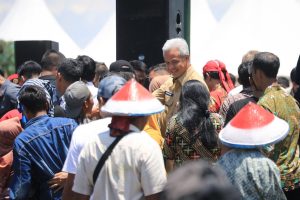Indonesian politics is rife with speculation about the 2024 presidential election – in particular, a possible political alliance between two prominent figures: Central Java Governor Ganjar Pranowo and Prabowo Subianto, the current defense minister.
Ganjar’s popularity in Central Java and Prabowo’s strong support in West Java and parts of Sumatra could give them an edge over other potential competitors, can could clinch the election in just one round. However, several factors could play into this alliance, including whether it commands the support of other political parties and what role President Joko “Jokowi” Widodo might play in brokering a possible alliance.
Speculation about a potential alliance between Ganjar and Prabowo began to swirl on March 9, when Jokowi invited the two leaders to join him on a visit to rice fields in Central Java. The results of the Kompas Research and Development survey for January-February of this year period suggest that if Ganjar-Prabowo teamed up, the two of them would be hard to beat.
The results of the poll show that Ganjar was the leading candidate for president, with an electability rate of 25.3 percent, an increase of 2.1 percent from the previous survey edition in October. Prabowo, meanwhile, came in second, with the support of 18.1 percent of respondents, an increase of 0.5 percent from the previous edition of the survey. The third candidate was Anies Baswedan, Jakarta’s governor during 2017-2022, who saw his support drop 3.4 percent from the previous survey.
If this coalition happens, it could become a formidable force at next year’s election, though it remains unclear whether he or Prabowo fill the presidential slot. While the Indonesian Democratic Party of Struggle (PDI-P), to which both Ganjar and Jokowi belong, would undoubtedly prefer its own candidate run as president, Prabowo’s Great Indonesia Movement Party (Gerindra) would argue that Prabowo, a two-time presidential nominee, has the experience, track record, and charisma necessary to be president.
The idea of a Prabowo-Ganjar or Ganjar-Prabowo coalition has so far prompted mixed reactions from the leaders’ two political parties. While Gerindra welcomes the idea, the PDI-P has yet to declare a candidate of form any alliances, and its support for Ganjar, despite his popularity, is uncertain. Not a few PDI-P members want Puan Maharani, the speaker of the lower house of parliament and daughter of Megawati Sukarnoputri, the chairperson of PDI-P, to run for the 2024 presidential election.
One of Ganjar’s shortcomings is that he has been accused of receiving corrupt proceeds from the government Electronic Identity Card program when he was a member of parliament, while his time as governor has seen several cases of land conflicts with residents in Central Java. For his own part, Prabowo has a history of human rights violations, which might also prove to be an electoral liability.
Then there is the question is whether Ganjar or Prabowo would fill the presidential slot. While PDI-P would undoubtedly prefer its own candidate run as president, Gerindra would argue that Prabowo, a two-time presidential nominee, has the experience, track record, and charisma necessary to be president.
Another factor that could play a role in this alliance is the support of other political parties. It is rumored that the United Indonesia Coalition (KIB), which consists of the Golkar Party, the United Development Party (PPP), and the National Mandate Party (PAN), will support Prabowo in the upcoming election if he is paired with Ganjar, as has the National Awakening Party (PKB), part of the Gerindra coalition during the previous election. However, the PKB’s leader, Muhaimin Iskandar was been mentioned as Prabowo Subianto’s vice presidential candidate, rather than Ganjar.
The question remains as to what role Jokowi’s might play in this scenario? As a PDI-P member, he is unlikely to have the power to influence party decisions regarding coalitions directly. However, as a popular figure and two-term president, his support could still be crucial in determining the party’s choice of candidate. If Jokowi supports an alliance between Ganjar and Prabowo, it could potentially make him the “kingmaker” of the 2024 election.
When it comes to winning the hearts of Muslim voters, the Prabowo and Ganjar candidacies both have strengths and weaknesses. Prabowo is known to have a strong base among conservative Muslim voters. In contrast, Ganjar has a strong reputation among moderate Muslim voters, particularly in Central Java, where he has served as governor since 2018. Moreover, Ganjar is seen as a unifying figure who can attract voters from different religious and ethnic backgrounds.
The election is expected to be closely contested, and if they don’t form an alliance, both candidates would expect to have solid chances of success. Prabowo’s Gerindra party is part of Jokowi’s ruling coalition, which gives him several advantages. Even so, Ganjar has gained momentum recently and has the support of several prominent politicians and figures. While the rumored alliance might prove a sure-fire vote-winner, it remains to be seen whether either party would be willing for its candidate to play second fiddle to the other rather than seeking the presidency for itself.
Ultimately, whether or not such an alliance eventuates, the election outcome will depend on various factors, including the candidates’ campaign strategy, ability to attract voters, and the issues most critical to voters. Regardless of who wins the election, Indonesia faces a number of pressing challenges including corruption, economic difficulties, increasing inequality, and ongoing political and social tensions. The new president will need to work to address these issues while also navigating the country’s complex political landscape while at the same time reducing political polarization.

































